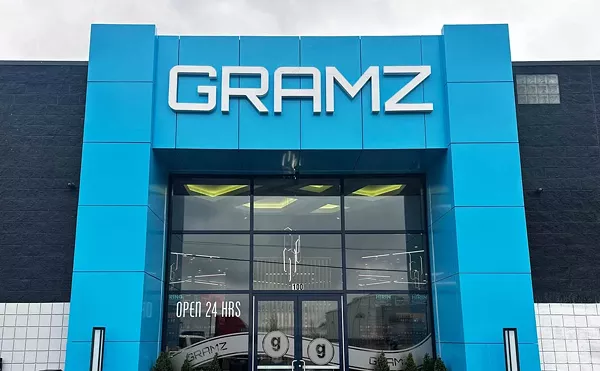Detroit City Council votes to increase recreational marijuana dispensaries, but new ordinance is delayed again
The cash-strapped city has missed out on more than two years worth of new taxes from the multibillion-dollar industry

Audio By Carbonatix
[
{
"name": "GPT - Leaderboard - Inline - Content",
"component": "35519556",
"insertPoint": "5th",
"startingPoint": "3",
"requiredCountToDisplay": "3",
"maxInsertions": 100,
"adList": [
{
"adPreset": "LeaderboardInline"
}
]
}
]

Se7enFifteen
Detroit City Council delays a vote on approving a new ordinance to allow recreational marijuana businesses to open.
The Detroit City Council is holding yet another public hearing on its ordinance to allow recreational marijuana businesses to open, after voting Tuesday to increase the total number of dispensary licenses available from 76 to 100.
Council members are required to hold another hearing with a public comment period since they made a significant amendment to the ordinance, city attorneys said.
Cannabis advocates were calling on the council to approve the ordinance Tuesday because Detroit has barred the operation of recreational marijuana businesses since sales became legal statewide in December 2019. As a result, the cash-strapped city has missed out on more than two years worth of new taxes from the multi-billion-dollar industry.
During that time, the council has been working on an ordinance that would ensure that longtime Detroiters play a significant role in the new industry. The council finally adopted a new ordinance in October 2020, but a judge blocked the city from approving applications for cannabis businesses, saying the ordinance “gives an unfair, irrational, and likely unconstitutional advantage to long-term Detroit residents over all other applicants.”
In February 2022, the council began debating a new ordinance that strikes a balance between equity for Detroiters and opportunities for others who aren’t longtime residents to get a license to operate a dispensary, a grow operation, a testing lab, and other cannabis-related businesses. The new ordinance provides two avenues to receive a license. One is for longtime residents who won’t compete against non-residents for a license. They will be eligible for city assistance with business plans, networking, and reduced licensing costs.
Councilman James Tate, who introduced the newest ordinance, downplayed the latest delay.
“This is not dragging it out,” Tate said of the public hearing. “We’re now seeing light at the end of the tunnel.”
Once the ordinance is approved, the council still has to determine where the businesses can operate.
Stay connected with Detroit Metro Times. Subscribe to our newsletters, and follow us on Google News, Apple News, Twitter, Facebook, Instagram, Reddit, or TikTok.






